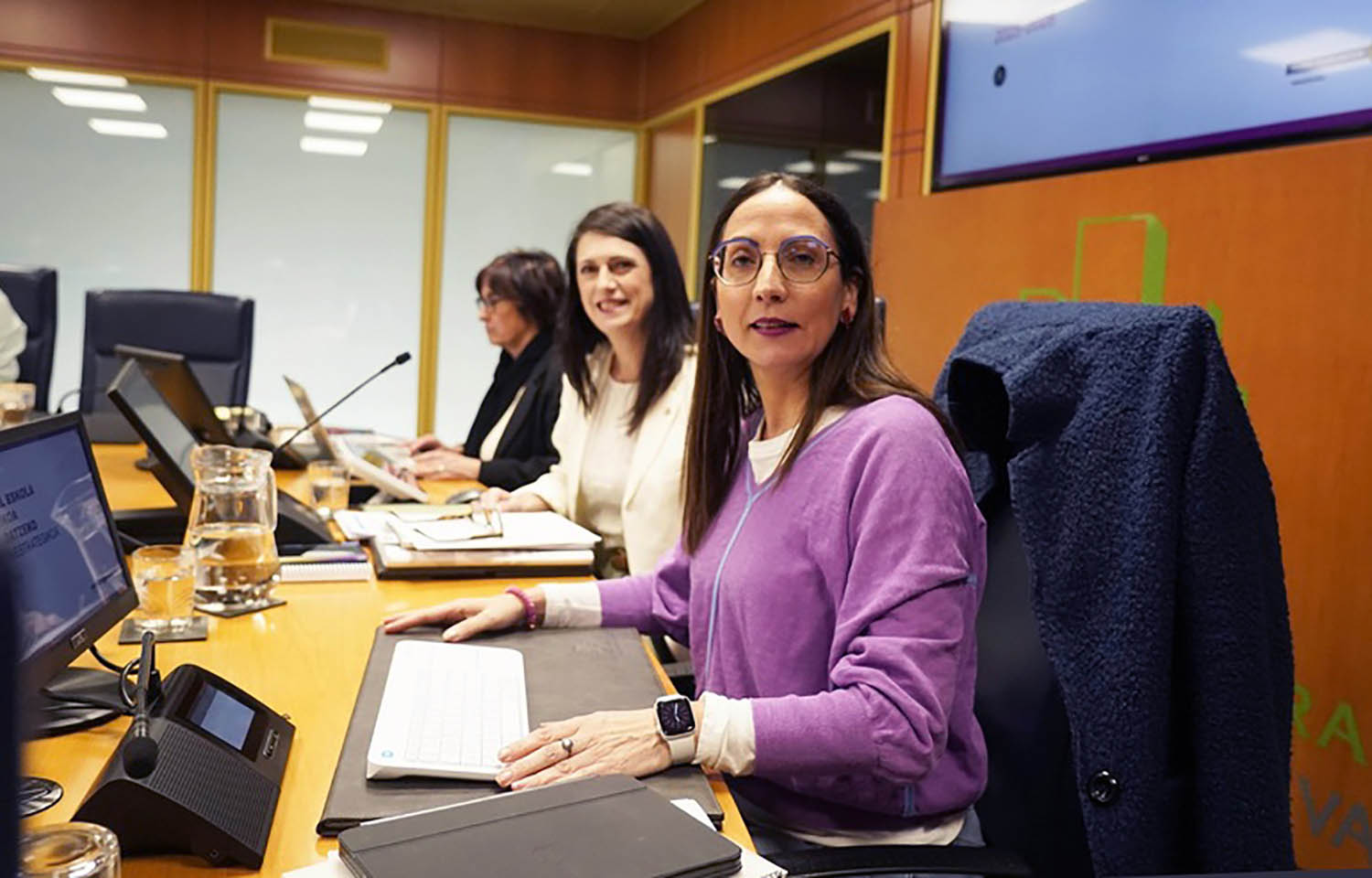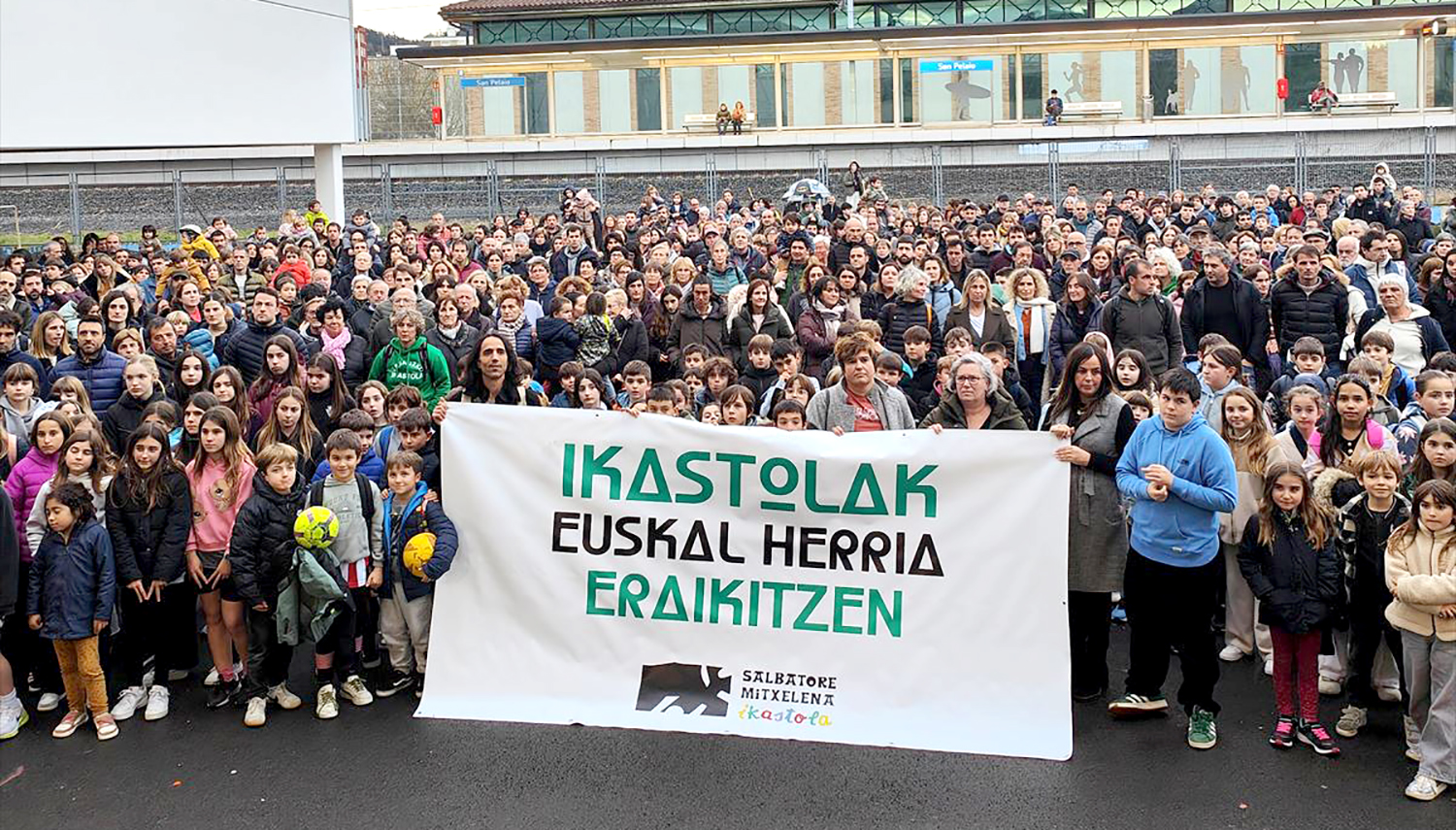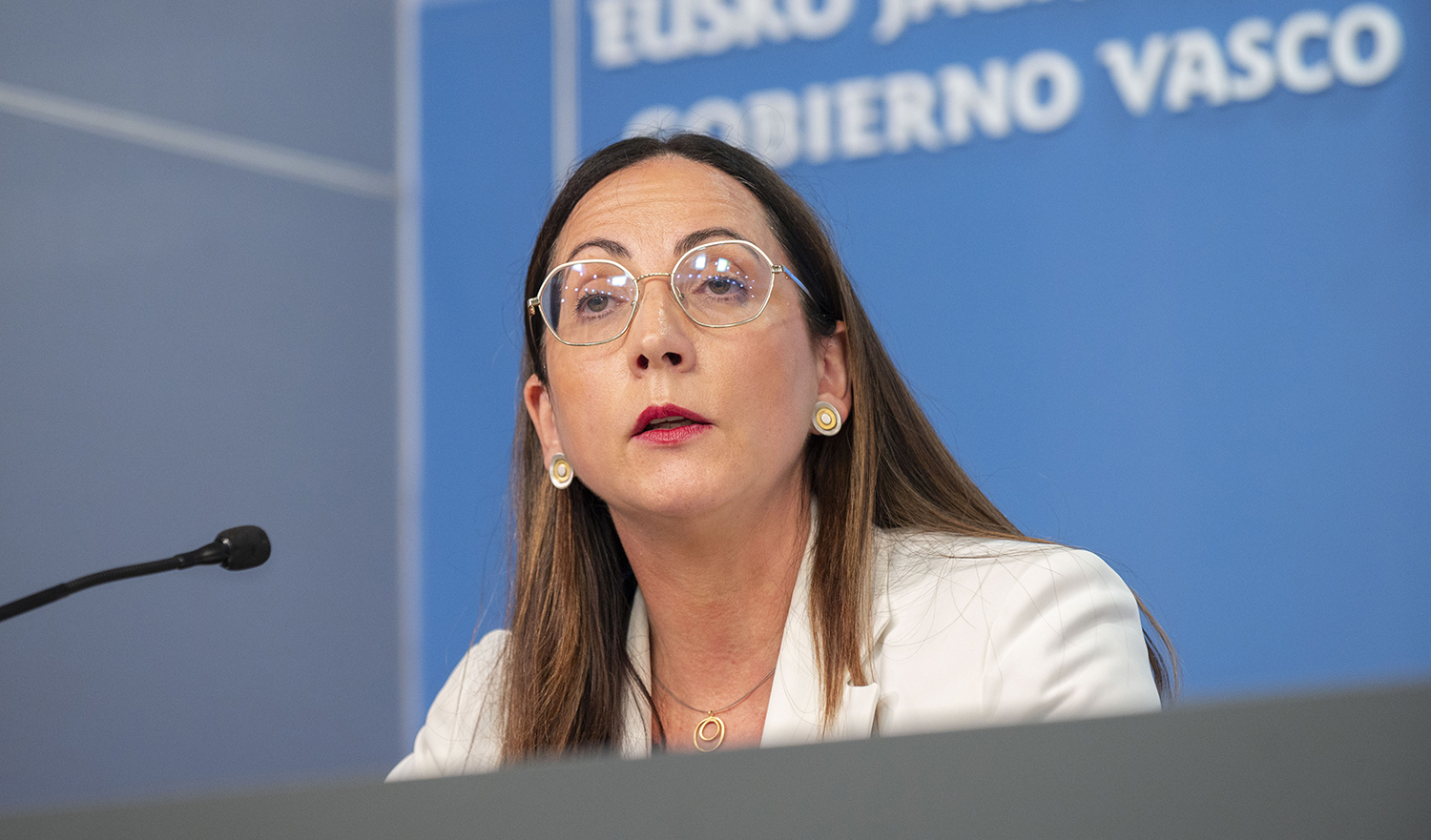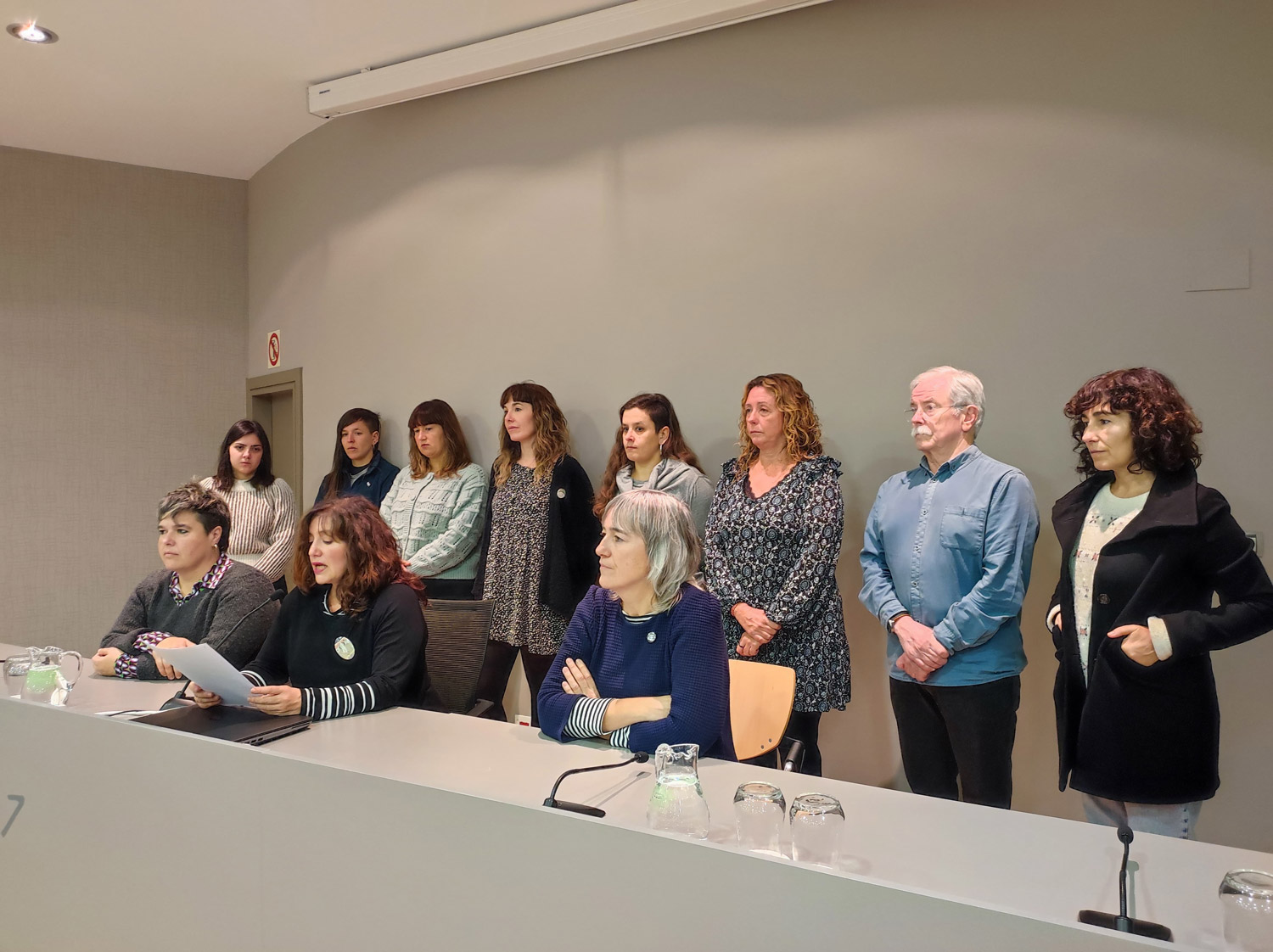"Along with the draft education law, very aggressive measures are being taken against the public school"
- More than 10,000 people participated this weekend in the demonstration convened by the Harro platform of the Basque Public School and sponsored by other agents, according to the Ertzaintza. “We are glad to see what we were originally sold as a total deal being questioned,” says Arantza Fernández de Garaialde, a member of the platform.

The rally brought many people together in Bilbao. What do you think is reflection?
This movement is not new, we have been calling for the strengthening of the public school and for action to be taken, but the draft bill is increasingly raising the issue and, above all, the unrest in the public network, the real concern. This preliminary draft does not address the problems we have raised and does not at all strengthen the public network. Moreover, with the presentation of the draft, very aggressive measures are being taken against the public school.
For example?
Since the signing of the educational agreement, the concerts of the private centers have been extended for the next three or six years, although it is known that the birth rate is decreasing, the private network is guaranteed that it will be able to maintain the same number of classrooms. So if the places disappear because of the fall in birth rates, where will they disappear? The number of alliances has increased. On the contrary, the planning decree provides that in the public network the centres have at least two lines, which may lead to the merger or disappearance of several centres. Guarantees are provided for the private network and conditions are laid down for the public network.
"Although the birth rate is decreasing, the private network is guaranteed the same number of rooms. So if the seats disappear, where will they disappear?
The event was attended by some of the signatories to the agreement.
We know they were members of EH Bildu and IU-Podemos. Some say that the preliminary draft has somehow betrayed the agreement signed in March. It is true that from the agreement to the preliminary draft it has worsened, but with the same agreement signed we were critical. We are pleased to see that we are questioning what we were originally sold as a total consensus. We thought that what they represented last year was not really real; perhaps they believed that this was going to happen without an extraordinary debate, or that each party ensured that their minimums came in… If things are moving and shaking, coming up with debates, it is a satisfaction.
Precisely because of mobilizations and strikes, there have been many voices against this preliminary draft. Do you think there will be enough pressure to influence the final text of the law?
It is still a draft of the preliminary draft and we believe it is. We know that at first they intended to do so, the deadlines are being lengthened and we are fighting for something, not just to express our opinion. We believe that other laws can be made and we are not desperate, we do not lose this fight, although we have many things against us. However, for us a new law is not so urgent, it is about guiding other measures and other educational policies.
You will keep fighting, but it seems difficult to change one of the pillars on which this law is based: Basque Public Educational Service. Accordingly, any eligible centre will receive 100% public funding. Why do you think it's not an effective formula?
Because it is a formula for continuing to do what has been done so far, giving a new name. They say that the conditions to be part of this Basque Public Educational Service are going to be put in place, but we have been doing it for 35 years, when the concert decree was approved, which is more rigorous than the ones that are now mentioned, that fees cannot be charged, that centers that attend vulnerable students, that take precedence those who drive the Basque Country, that all religious actions are voluntary… and for example, it has never been done and done. Now, to solve the problems posed by this double system, they propose to do the same, but calling on the Basque Public Education Service. Although it calls the private public, it does not make it public.
We have been working on a road for 35 years and the result is segregation, the lack of euskaldunization, especially in the private network, and indoctrination. And what does it propose to do to overcome this situation? Do the same, worse, saying they're part of the public service. It has neither feet nor heads.
"The Treaty Decree adopted 35 years ago is stricter than those now mentioned, but has not been complied with or implemented"
If the measures are written, then are the implementing mechanisms?
That's it. And it's also very easy.
You have criticized that one of the main problems of this double network is the segregation of students. The Government has just presented the decree on the equitable schooling of students. Basically, all centers supported with public money should reserve places for the most vulnerable students. How do you value it?
The decree is 2018, it was already said, but the latest education law of Madrid of the LOMLOE says that it needs to be done, and that is why the government has begun to implement the decree. In four years it has not been done, we shall see. In the new enrolments it affects 2 and 3 year Early Childhood Education students and at these ages some characteristics can be identified to qualify them as vulnerable (e.g. the socioeconomic and cultural index of the family), others can not. It also affects students who register late, but a commission of the administration decides, supposedly in a balanced way, at which schools those students who have come along the course are enrolled. What happens? Suppose they send a student with few economic resources to the private one, the family will see that they have to pay the fee, or that the price of the dining room is too high in the private one, even with school supplies… and on the flip side that student will end up in a public school.
The key is not the distribution of students, but the public network is a reference for all: when there is over-enrollment, we apply scales and exclude high average incomes from the public network, and although the prioritization of low incomes has logic, we must think of a system, in a logical planning, that allows the centers to acquire the population of the environment. Not all centers will be the same, but we don't need it, it will be the center that corresponds to the environment, rather than some neighbors becoming famous for the school next to the house.
"We know there are poorer neighborhoods, but in the schools of those neighborhoods there are only the poorest in the neighborhood, they take the others to another center"
But from one neighborhood to another there is no difference; are neighborhoods not linked to different socioeconomic contexts?
Yes, it is, but we are more concerned that the centers do not have the profile of their neighborhoods and villages. It happens to us that two schools are very close in different neighborhoods and villages, and that the characteristics of both are very different, that the students are separated, what we call segregation. And we know that there are poorer neighborhoods, but in the centers of those neighborhoods there are only the poorest in the neighborhood, they take the others to another school. That is the problem.
Returning to the balancing criteria of enrollment, he says that although students' access is equated, a certain profile will end up leaving the concerted network. So what is the solution?
What's happening to us is that, so we say it. What is the network that covers all children? Public network. We will strengthen the public network. Imbalances can also occur between public centres, but by belonging to the same network measures can be taken. And, however, in the acceptance of students, conditions and control mechanisms must be established taking into account both networks, and access to advertising must be facilitated to the private network, but at this moment there is no motivation to make the centers public.
To really euskaldunize the students, the large majority requires generalizing the immersion model in all centers. Is the law also far from receiving it?
Models A and B are mainly found in the private network, so the immersion model may not be generated because it does not disturb the private network. We are told that this law is being drafted to meet the challenges of the educational system, but it does not address them, will it not seek to shield the private network when the birth rate is falling? Three languages will be the language of instruction, they will try to introduce English into 3 year classrooms (until now it enters 4 year classrooms)… What comes this? We do not know, it has no basis, but it does not strengthen Euskaldunisation.
"We have no interest in fighting ikastolas, we are discussing what educational system we need for all"
Do you understand that not limiting the religious offer also benefits the concerted?
The agreement stated that the hours of religion were the minority required by LOMLOE, but in the preliminary draft this has disappeared and now it says: “An educational model based on secularity will be developed, respecting the nature of private concerted centres”. More than two-thirds of the concerted centres are religious, Catholic, and their objectives are evangelization. How will this be respected based on secularity? I don't know what they're doing when they write these things.
In public debate, however, the Christian School is in the background, the biggest stir seems to be between the public network and the ikastolas.
Yes, and sometimes the debate is taking place very violently. It is a pity, because on the one hand it conceals that the main employers in the private network are religious centers, and on the other hand, because the centralization of ikastolas distorts deep debate. Ikastolas often put their model on the table, and it is true that we have in common objectives, such as Euskaldunization, but perhaps private ikastolas have to explain what benefits the private ownership of their centres brings to the Basque Country. A total of 44 ikastolas were published 35 years ago, and I do not know if you dare say that these ikastolas no longer provide anything. No one denies the merit of the ikastolas, their bravery and their leadership in history, but we are at another time. We have no interest in fighting the ikastolas, many ikastolas form a compact community, but we are not discussing whether that is better or worse for those students, we are discussing what educational system we need for all.

Why concerted teaching?
The new Education Act adopted by the CAV against most public school officials aims to ensure that concerted education is free of charge through the financing of public authorities. The Spanish State has also announced a significant increase in public... [+]
Hunters, Marianistas, Niño Jesús, CEU San Pablo - Virgen Niña, Carmelitas, Presentation of Mary, Vera Cruz, NClic, San Viator, Escorapias, Scholapios, Bárdarias, Nazareth, Immaculate Conception, Hogar San José, Egibide. More Olabide by Eusko Ikastolen Batza. Finally, the... [+]
In response to the numerous statements of the new Education Advisor, Begoña Pedrosa, Law 17/2023 on Education will be implemented at the beginning of the course, approved in Parliament with the sole support of the PNV and the PSE. This implementation will entail the application... [+]
Who orders us ...?
The Basque Government has just been set up and the Minister for Education will be Begoña Pedrosa. Being a vice-counselor in the previous legislature and being one of the founders of the new Education Law passed last December, we are allowed to ask some... [+]
The recently passed Education Act is as bad as it is new. Throughout the processing process there has been a broad social sector against the spirit of this law, and this opposition has been greater in the face of its adoption. We want to make public the assessment and reflection... [+]
The new Education Act, which had to be born of consensus, was adopted in anger and disagreement. The lack of agreement is due to the public-private question and linguistic models. A lot of pity.
In this we follow the Spanish model, because in the CAPV we are not able to lay... [+]
Those of us who write and sign these lines are young people between 20 and 26 years old who have joined us in the context of the generational relay of Euskalgintza. In our case, we have decided to contribute to the struggle of the Basque Country in the Basque Country from... [+]

















